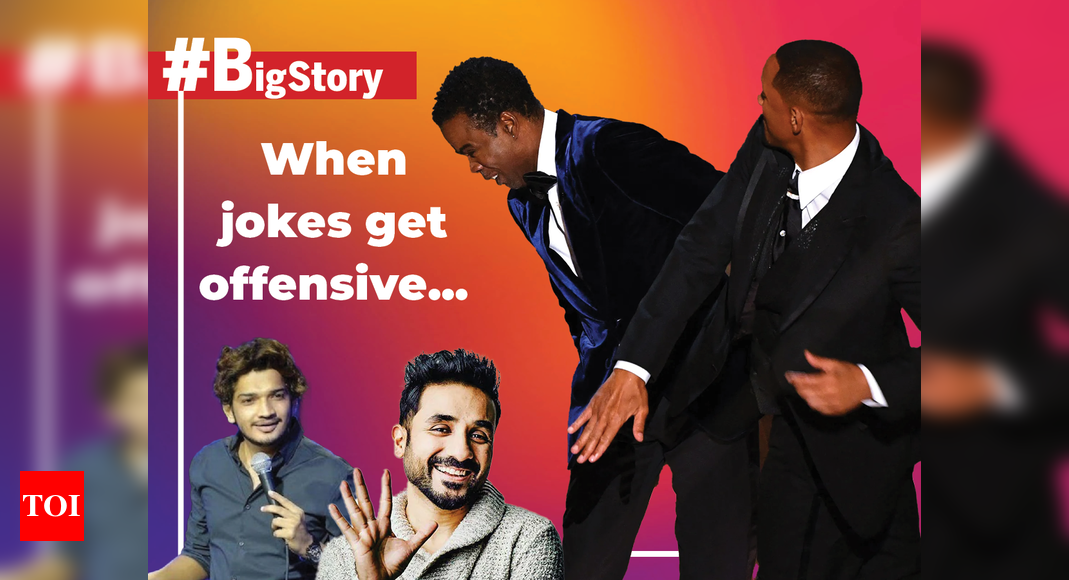
The 94th Academy Awards was perhaps the most dramatic Oscar ceremony we’ve witnessed in many years, one that culminated in a huge controversy after Will Smith walked up to the stage to slap comedian Chris Rock who cracked an ‘insensitive’ joke on the former’s wife Jada Pinkett Smith. Yes, Smith did apologise for his behaviour at the ceremony while accepting his Oscar for Best Actor, and also tendered another public apology to Rock in a statement condemning his action calling it ‘unacceptable and inexcusable’. With quick thinking on the feet, Chris Rock reacted to the situation with another punchline, only to see the matter escalate after the ceremony, with the Academy launching a formal investigation into the matter.
While this was arguably one of the most embarrassing things to happen to a comedian hosting an international Awards night, such instances of comedians facing the wrath are a commonplace occurrence. In recent times, we’ve witnessed growing instances of attacks on comedians. It was not long ago when Munawar Faruqui, a comedian from Gujarat, was jailed for a joke he reportedly did not crack. Vir Das’ satire ‘Two Indias’ became popular internationally and so did the flak it received back in the homeland. A little while back, AIB faced legal consequences over their 2015 roast after attracting widespread public backlash. Which brings us to our #BigStory this week – Is humour under threat from woke culture? Read on.
Is violence against a joke justified?
While Chris Rock made a joke out of the slap incident at that moment, he did agree later he was still ‘processing what happened’. While interacting with his audience at a latest gig, he said, “Except for some other pretty weird things, life is pretty good right now,” while calming down a fan who abused Will Smith for his behaviour.
Actor Chunky Panday found the whole slapping episode ‘quite disturbing’. “Violence is never a solution to anything. To think of it, with the kind of fun that we have made of people on stage, we should be wearing bulletproof vests (laughs). Getting physical is bad. That’s not a solution to anything. Someone’s throwing the wrong words, you should throw the wrong words back, but not react with violence. But then come on, give him the benefit of the doubt. Maybe his mind must have been going through a lot of sh*t. I’m sure he’s a great performer, a great human being. It’s one of those incidents that happened on such a big platform, the whole world watched. But yes, it’s absolutely wrong,” he said to ETimes.
Comedian Amit Tandon was shocked by what happened. “It was a bad joke. That aside, the reaction to that bad joke was way worse. It’s not that it would be a surprise for Will Smith that there were jokes being cracked about them. But yeah, the joke about the medical condition, that was below the belt. But still, the reaction of Will Smith was very unfortunate, because one of the most popular celebrities in the world, getting on stage and slapping another celebrity, it gives a license to anybody who’s watching, to go and take an action against a comedian or a performer if you don’t like him,” he explained.
Veteran actor and comedian Johnny Lever believes Smith should have taken the joke in his stride. He told ETimes, “He could have hinted with a sign or something, while being seated in the audience, he could have signalled Chris Rock to not do it. Chris would have understood. Later he realised it was wrong. On the other side, Chris became a star. There should be some tolerance as well, whether the joke is good or bad, let people decide. There is so much to learn from this incident.”
Johnny’s daughter Jamie Lever, who has also made her mark in the field of comedy, thinks Will Smith’s reaction was out of line as well. “The incident went too far because here you’re talking about a medical condition. But I would also say the reaction that came from the other end was even worse. In my opinion Will Smith could have stopped him right there, but using force or violence, punching someone is out of the line,” she elaborated.
Writer Siddhartha Ashish Dey, who has also scripted Award shows is a fan of Will Smith and believes Chris Rock and the writer are the bigger offenders. But he agreed that what Will Smith did was wrong. “Violence is an absolute no-no. But one who provokes for violence is a worse offender. Nobody has the right to make a joke – good, bad or ugly – on anyone undergoing a medical condition. One less joke won’t harm you. But one sad heart would definitely hurt. Chris Rock and his writer were worse offenders in this case. Mr Smith definitely is a victim here, while Chris Rock’s joke is uncalled for. As writers, we don’t need to be desperate to make people go ROFL. A smile is enough, if it’s on every face in your audience. A show is successful, if everyone goes back with a happy heart,” he said.
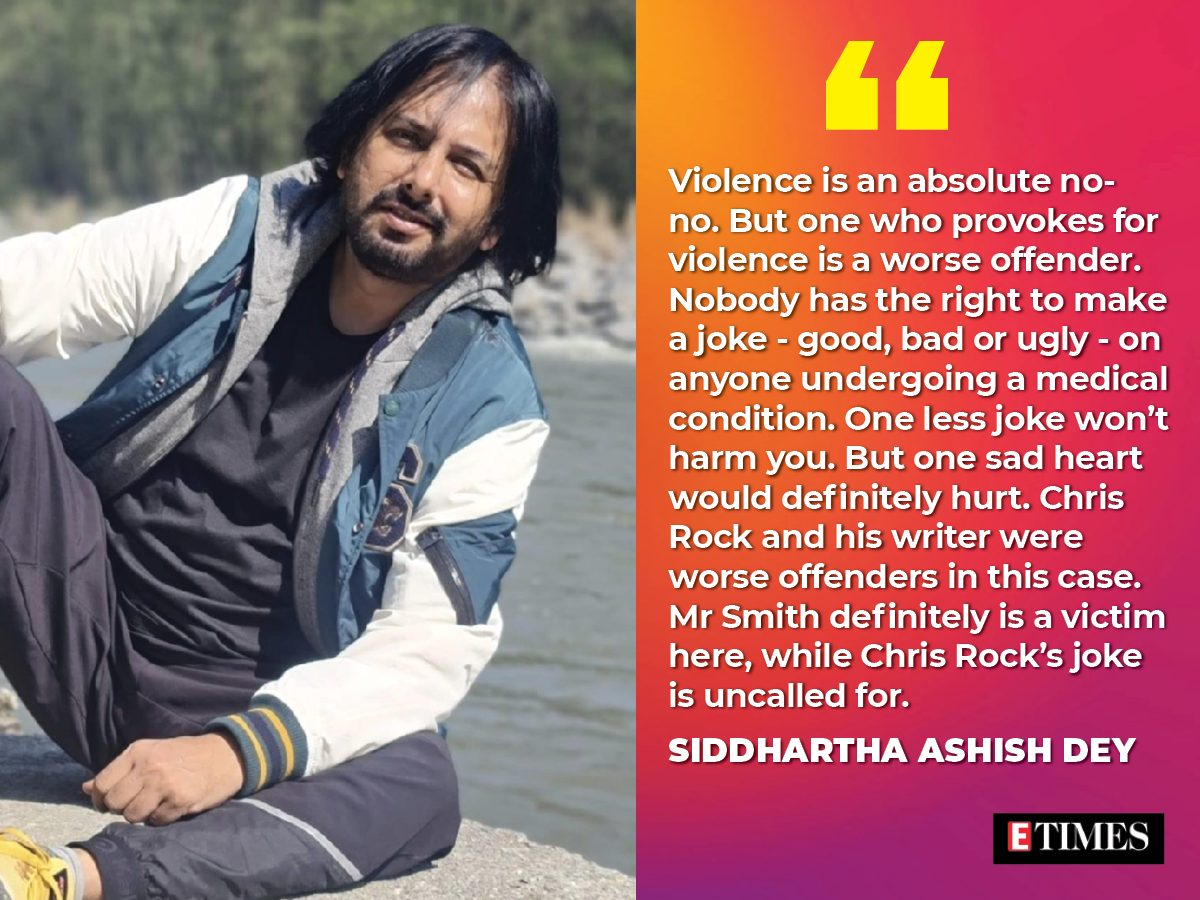
Why so offended?
What is it about a joke that offends people so much? Are we becoming more intolerant as a society? Amit Tandon believes that social media has made a big difference by bringing everything to light. “People do not understand the difference between Twitter and their drawing rooms. Because a lot of things that you would say at your home, politically incorrect things, whether it’s jokingly or seriously, when you’re sitting with your friends… putting it out there, people don’t realise that when you’re in your room, you’re talking to 10 people. But when you put it out on Twitter, it goes out to 5 million people who can watch it for the rest of their life. It can ruin careers, they’re quoted 10 years later, and people lose their jobs. And when you find a written word, which you can read again and again, or a video that you can watch again and again, it only makes you angrier. If something happens in front of you and it passes by, your anger will subside after a while, but if you can replay it 10 times, your anger gets doubled every time. And that’s what social media has done.”
Jamie Lever agreed to this assessment as she added, “People have become more sensitive because of the rise of social media, and with so many opinions out there, the slightest of things are getting a lot of attention. Even in this case, when Chris Rock made that joke, Will Smith’s initial reaction was that he laughed. And then the second thought was this is specifically about my wife. So people are not realising, but they are becoming overly sensitive.”
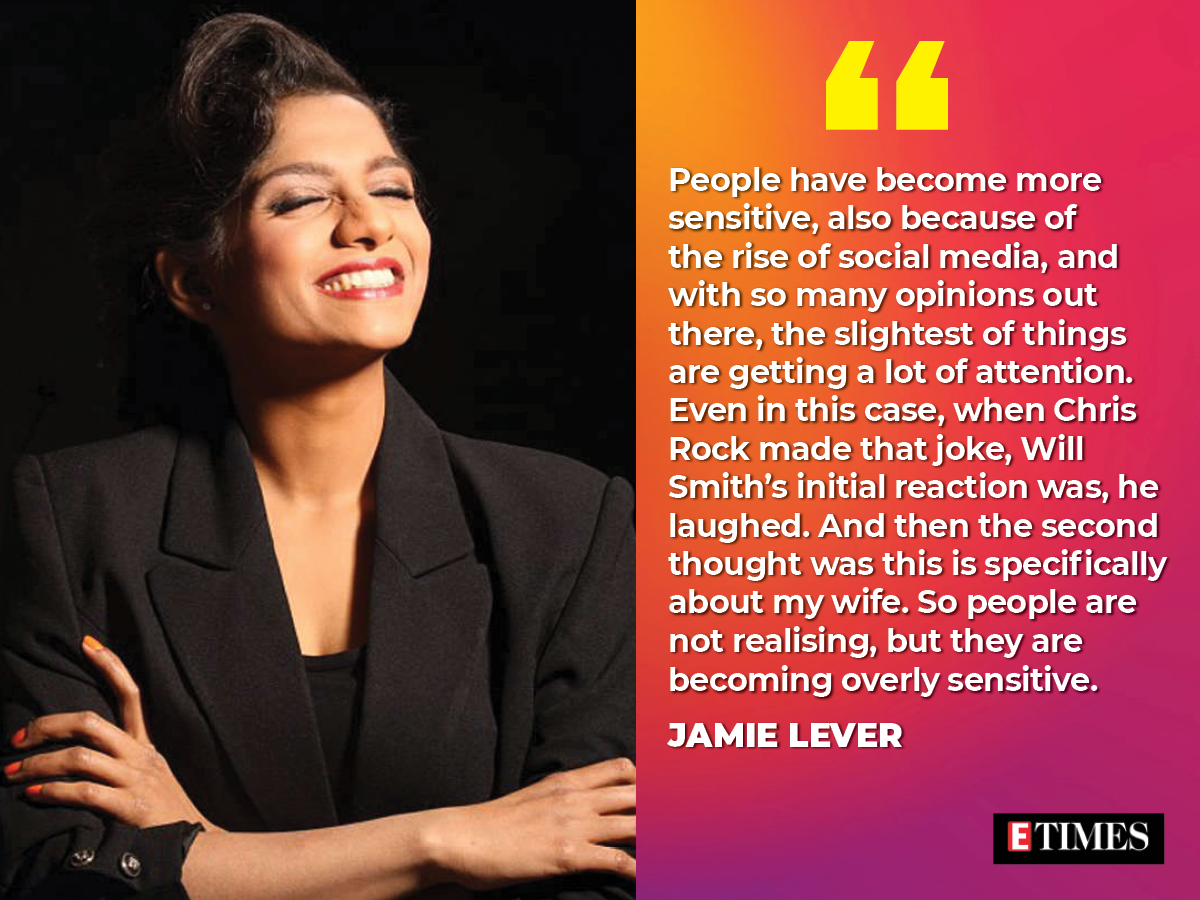
Siddhartha Ashish Dey believes people miss out on the bigger picture. “Every time an incident like this happens, the world becomes enthusiastic to jump into conclusions and take sides. People either empathise with the version of X or with the version of Y. Very few want to look at it from the top angle, because it takes depth and height of a human heart to do so,” he added.
Where to draw the line?
With an audience that is sensitive to jokes, should comedians observe restraint while on stage? “Come on, you’re there to have fun and make fun,” Chunky disagreed. “If they find it offensive, they should not attend. I go to so many award functions where people make fun of me and I laugh at myself. I feel if a comedian really wants to make a lot of fun, he should first make three jokes on himself and then two on others,” he added.
Actor Maniesh Paul, who has hosted several award shows, agreed that some topics have become too sensitive these days. “As a host, as an actor, as a performer, we filter the script so much so that no one gets offended by anything. Thankfully, no one has been offended by my act so far. I joke around so much with Karan Johar, I pull Varun Dhawan’s leg so many times, I have imitated Amitabh Bachchan, I joke around so much with the audience. It depends on your sense of humour. As artistes we filter a lot of things while performing, it is also our responsibility to check what the writer has given. Whenever I host an awards night, I perform as if I am in the drawing room of my house, and I am performing in the presence of my family. It is reciprocated from the audience as well, touchwood,” he said.
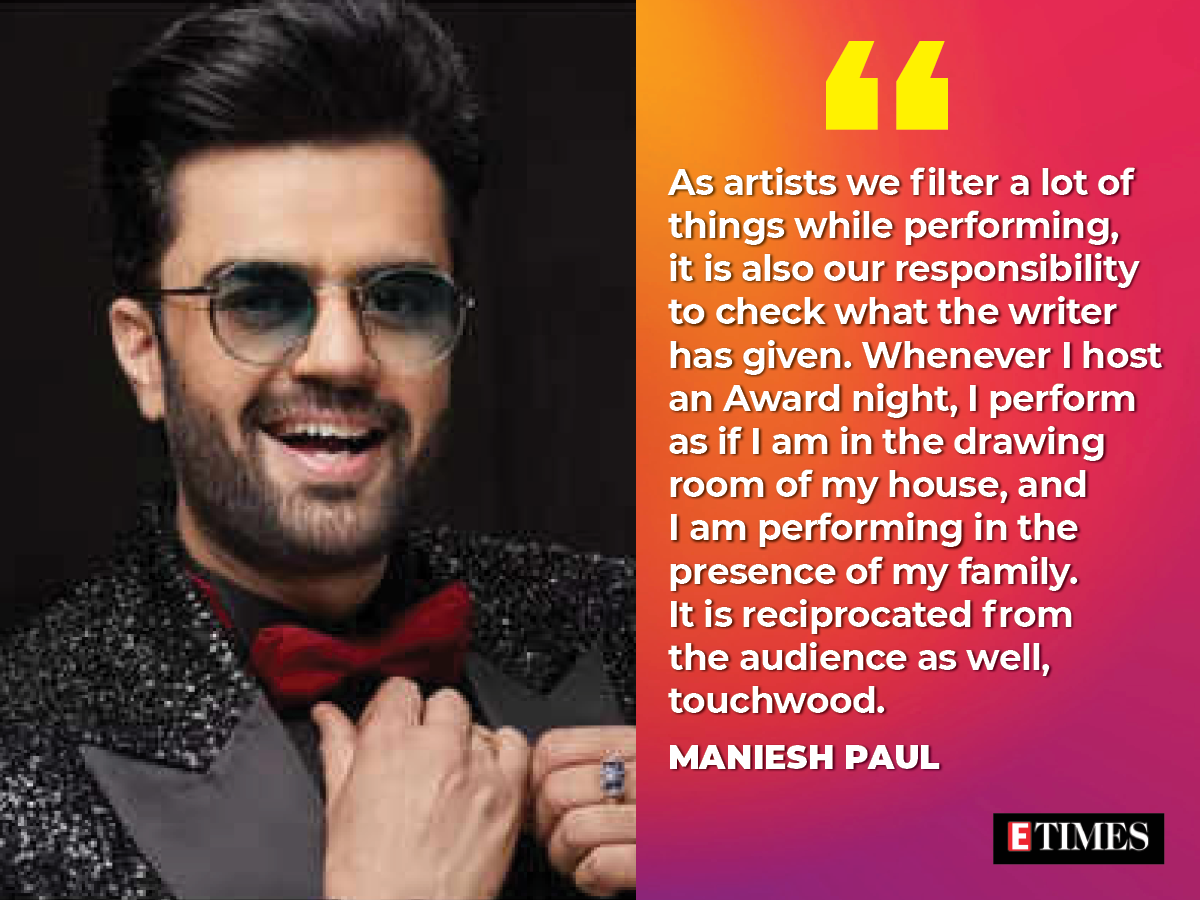
Amit Tandon stated that every comedian defines their own line. “But when you are pushing the boundaries, you have to be mentally ready, there could be legal consequences,” he cautioned. “But you can’t be ready for physical violence. Those consequences you can’t predict. When you are in a society and you are talking to people that you don’t know, there can be consequences. But a proper legal process has to be followed. But when someone beats you up, that can be dissuading, that’s very scary,” he added.
Jamie Lever said as comedians, she and her father Johnny Lever have been very cautious about what they say. “We stay away from satire, or anything that will hurt sentiments of people. Being in the industry, I realised that Indians are very emotional. So there is a line that you have to maintain. A similar incident happened a few years ago at an awards show. Sajid Khan is known for being witty and using sarcastic humour. He was hosting the awards when he said something and it did not go down well with Ashutosh Gowariker. He did not appreciate what was said and he stopped him right there. There was a little confrontation while he was seated in the audience and later while he was collecting an award on the stage, he did point out that it was hurtful,” she recalled.
Jamie has turned down jobs where she was told to use foul language as ‘the audience enjoys below the belt jokes coming from a female’. “I don’t have to use that kind of humour to get laughs. I don’t want to use the ‘F’ word unnecessarily to get more laughs. My content is strong enough or I’ll work harder to make my content stronger,” she added.
If a comedy hurts sentiments, it’s lewd and crude, opined Siddhartha. “A joke on a bad film is a good joke. A joke on a bad or good performance in a film, can make for a good joke. Aamir Khan’s extreme level of perfection is a material for good jokes. But when someone cracked a joke on Lata Mangeshkar ji, outliving her stay in this world, it was trash, crass and absolutely unnecessary,” he said.
Siddhartha called it quits with a music award show as he was asked to write jokes on Kailash Kher’s height. “I found it gross. The argument went to an extent that I left the show two days prior to the shoot. After many years, I saw a similar thing being done to Neha Kakkar. It was puke-worthy. I literally wanted to vomit,” he recalled.
Does that mean that comedians can’t make funny comments on people’s weight and size? Complexion and shape? “Well, this is subjective as these are reformable, transformable and repairable issues. Sometimes we do, as long as the person in concern, participates. Like Bharti Singh. She doesn’t mind being a target, as long as the other person doesn’t cross lines and then she gives a befitting and funnier reply. Everything is happy-happy,” added Siddhartha.
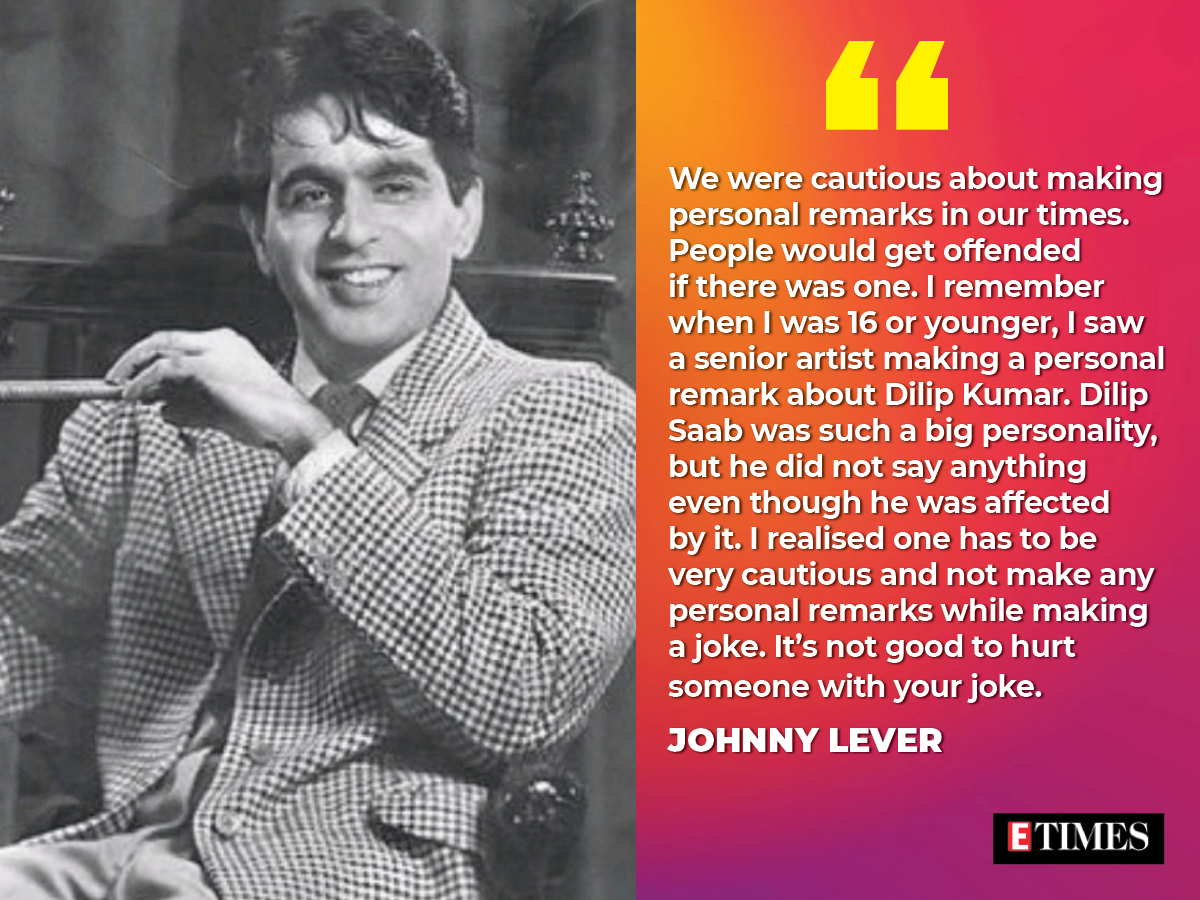
Johnny Lever believes people have become more intolerant these days. “We were cautious about making personal remarks in our times. People would get offended if there was one. I remember when I was 16 or younger, I saw a senior artist making a personal remark about Dilip Kumar. Dilip Saab was such a big personality, but he did not say anything even though he was affected by it. That senior artist got so personal, that if Will Smith could walk up to the stage and slap the comedian, Dilip Kumar could have shot him. I realised one has to be very cautious and not make any personal remarks while making a joke. It’s not good to hurt someone with your joke. Artists cracked jokes on Dilip Saab, but no one dared to crack a joke on Balasaheb Thackeray. More than the celebrity, their fans get affected,” he said.
Take it with a pinch of salt?
“Some of it, yes,” says Amit Tandon. “What we need to remember is that every joke has a punchline, there is always a catch. There will always be a character that people will laugh at. If you are laughing, you are laughing at a character. For example when I do a joke, I am laughing at myself, I am laughing at the middle class. There are still people who will take offense that I am making a joke at the middle class. So yes, we need to develop a sense of humour. We need to get better at taking a joke and moving on.”
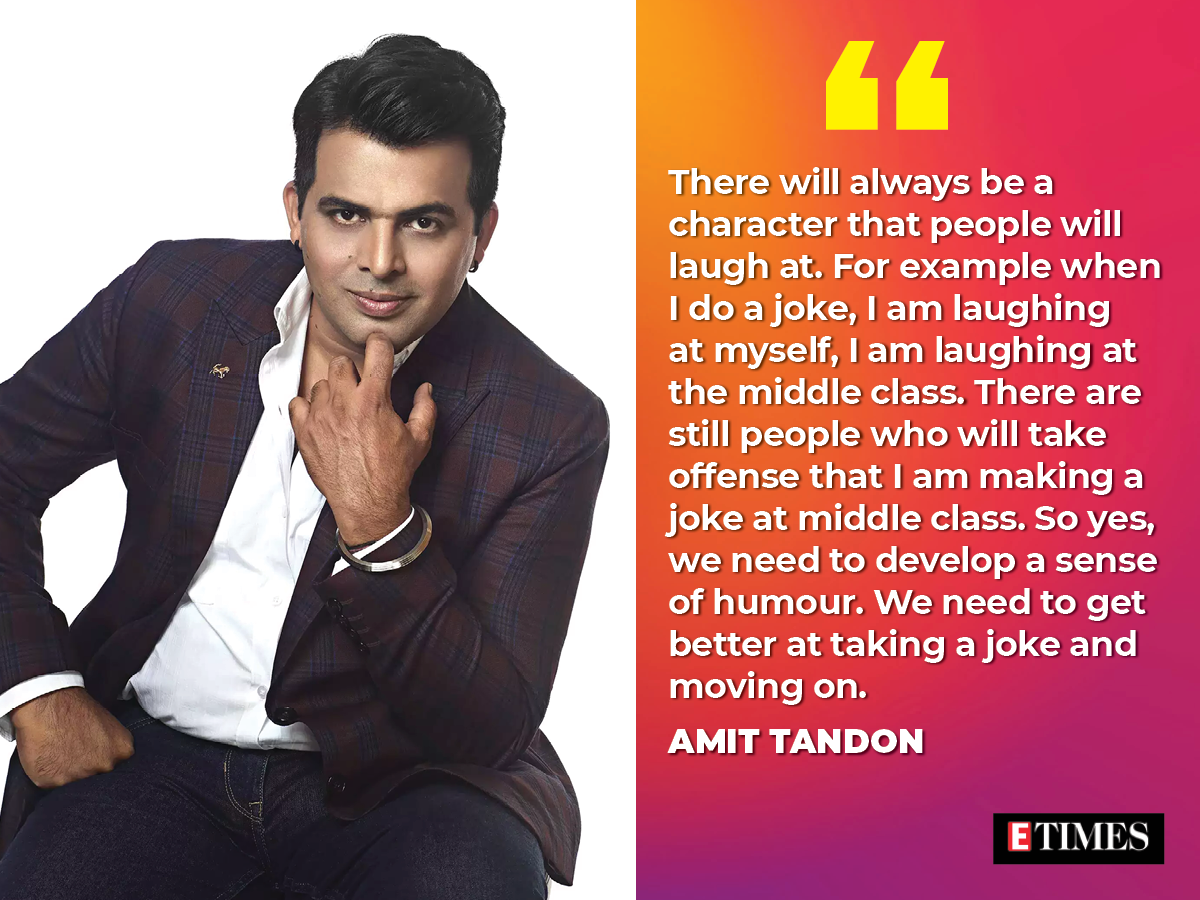
If one must, there is a legal recourse that can be taken, he further stated. “Like in the case of AIB for example, it’s a legal recourse that people have taken and it’s an ongoing court battle. It’s a much better way if you’re offended by something. Take it to the court, raise your voice, I’m not saying a comedian can say anything to anybody and nobody objects.”
Chunky Panday on the other hand has taught his kids to be a sport. Talking about Ananya taking jokes on her, he said, “I have taught her that… I had told her that if you have to be relevant, people have to talk about you, good or bad or make fun. You have to be the centre of conversation. We’re there for the taking. We are all performers, we are all in the public eye and these things are going to happen. So as I said, if you find it offensive, you shouldn’t attend.”
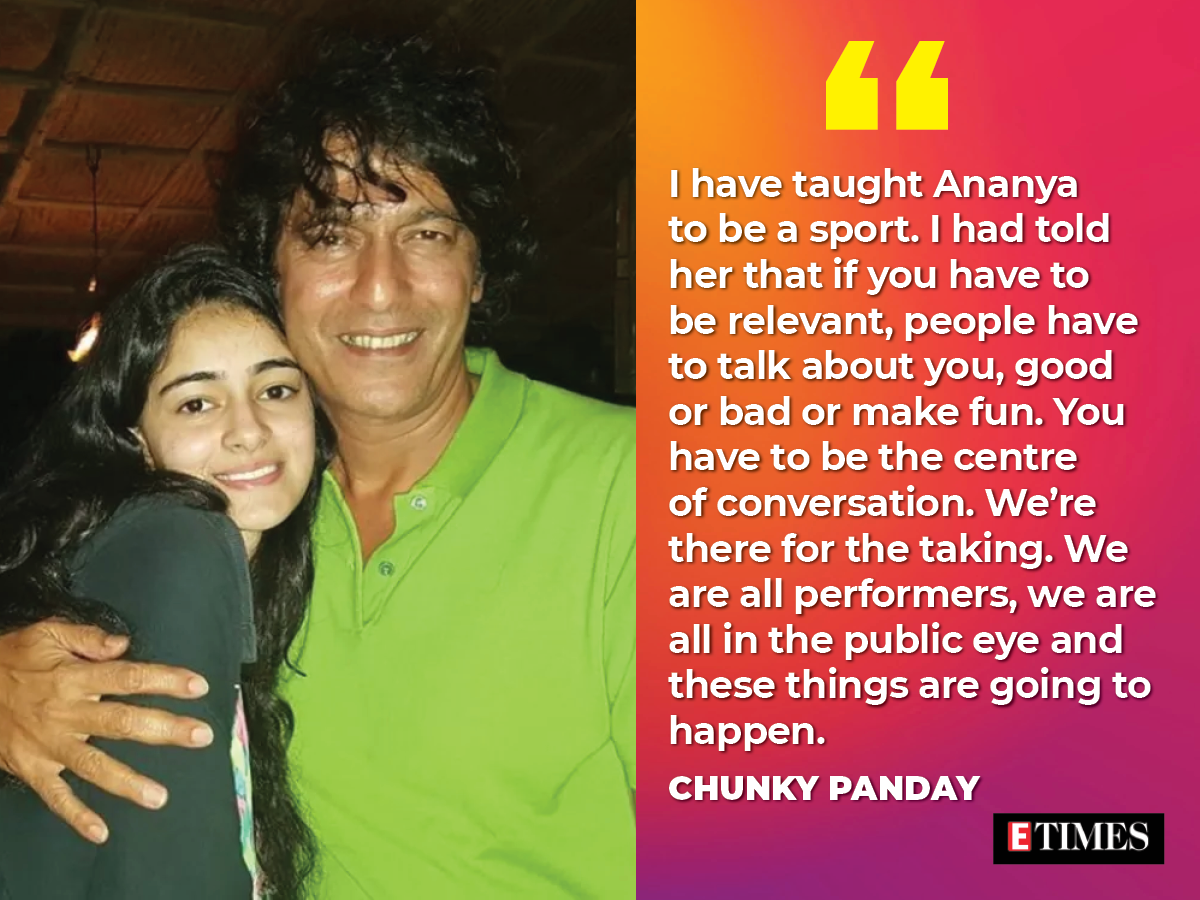
Do comedians need protection?
“There can’t be a separate law protecting comedians, you can have something like that,” asserted Amit Tandon. “We are as much performing artists as everybody else, we have as much freedom of speech as everyone else. At the same time, we need to abide by rules as everybody else. Just like movies, there can be certification that we anyway follow. We announce if a show is for 18+ or 15+ audience, but after that I don’t think there should be a separate law protecting humourists or comedians.”
It’s a very fine line when someone offends the other with a joke, believes Chunky. “It’s like me, as Aakhri Pasta, after saying something stupid, I say, ‘I’m a joking.’ So it’s like, you may say something serious and then say I’m joking. So it’s a very fine line between offense and other things. I think humour should not go away from society. We should learn to laugh at ourselves and at others. I know it’s very difficult to take a joke on yourself, but you should take it in your stride and enjoy it. But there shouldn’t be any laws. Why restrain yourself? If you find something funny, go out and express it and the other person can express what they feel. So many people express so many things that may upset me, but that is their freedom of speech,” he concluded.